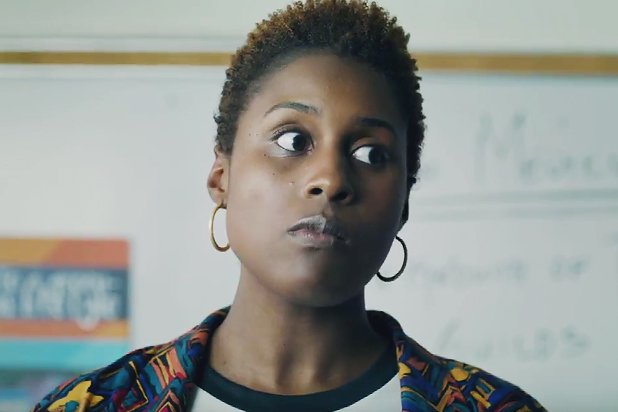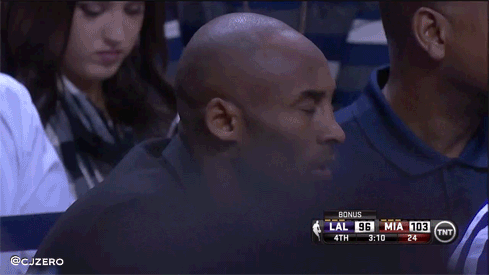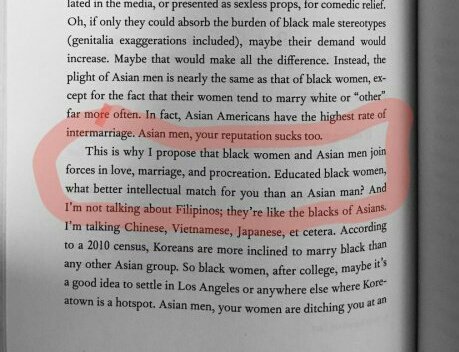Criticism Of Issa Rae Reveals Prejudice Against Blacks
When I first came across the Newsweek headline “Issa Rae’s Book Calls Filipinos ‘The Blacks Of Asians,’” I immediately scrolled to the next article and went about the my day. Then today this title made it’s way into my line of sight: “Yes, We Need To Trot Out This Old Issa Rae Book Excerpt.” And the voice in my head said, “Are we really doing this?”

The book quote in question is as follows:
“Educated black women what better intellectual match for you than an Asian man? And I’m not talking about Filipino’s, they’re like the Blacks of Asians. I’m talking Chinese, Vietnamese, Japanese, et cetera.” — Issa Rae, Awkward Black Girl
Here is the argument from the author of the article, Teresa Jusino, on the problem with Issa Rae’s statement:
“She then goes on to say that Filipino men weren’t “intelligent and hard workers” like other Asian men. What?
Now, she may have thought she could get away with calling Filipinos “the blacks of Asians” because she’s black (Hey! I’m making fun of my own group too, so this is cool, right?), but you know what she’s not? Filipino, or in any way Asian. (unless there’s something I don’t know)” — Teresa Jusino, MarrySue.com
She goes on to say:
… You don’t get to take liberties with self-deprecating humor about any group other than your own. That is not your place, and being a person of color doesn’t change that. This is something that’s been bugging me a lot lately. There’s a lot of (well-deserved) focus on white privilege these days, but that doesn’t mean that white people are the only source of discrimination, or cultural appropriation.

I reeeeeeeallly don’t like having these conversations any more, but I have to say something, because I can really see this becoming something ridiculous and Issa Rae making a public apology or unnecessary statement for people who are trying to witch hunt her.
My main argument is that the joke was not racist at all, and actually the outrage expressed in the articles attacking it are actually what was racist.
And now I will proceed to dissect the joke and the article to support my point of view.
Issa Rae’s style of humor is what is known as deadpan or dry humor.
“Deadpan, dry humor or dry wit describes the deliberate display of a lack of or no emotion, commonly as a form of comedic delivery to contrast with the ridiculousness of the subject matter. The delivery is meant to be blunt, ironic, laconic, or apparently unintentional.” -Wikipedia
Anybody can easily watch her anywhere (interviews, acting, etc.) and see that she relies heavily on a mix of sarcasm and dry humor to deliver powerful social commentary. A huge reason for her meteoric rise is her seemingly effortless ability to leverage this skill in taking the sting out of some of the painful truths of society that need to be said. In fact, isn’t that what all good comedians do (i.e. say painful truths in a way that is easier to swallow)?
This comedic style is not the most common, but is growing in popularity and could be seen in such celebrated comedians like Ellen DeGeneres, Stephen Colbert, Zoey Dechanel and many others.
While that may come across well in person, especially when one acknowledges or recognizes Issa Rae’s world view, body of work and style of humor; it may be missed in the printed word. Now, when I read that statement, I immediately heard it in my head in Issa’s voice as informed by the context of scores of her content which I have consumed over the years. So, I completely understood what she meant. However, for those who do not, let me break it down for you.
First of all, let’s acknowledge that her memoir was saturated with the above mentioned type of humor. Among other intentionally rhetorically humorous statements, she makes a lot of biting commentary about being “half-rican” a term she coined that describes her mixed heritage of half-African American and half-African (Senegalese).
Now that we have established the voice of her book, let’s look at the first sentence of the controversial quote:
Educated black women what better intellectual match for you than an Asian man?
Here, Issa offers us the cultural stereotype of Asians being of higher levels of intelligence than the average person. This is a belief that is widely accepted to be a mere stereotype by people who believe that environmental factors are one of the biggest influencers on academic performance.
Books like Tiger Mom and shows like Fresh Off The Boat also bring up that stereotype and acknowledge the relationship between this stereotype which is statistically supported and another stereotype about the hard-working, over-achieving Asian.
Which you acknowledge that she mentions, but you didn’t seem to have a problem with that stereotype. In fact, the part that you did have a problem with is very telling. It seems that your big issue was with her next statement:
And I’m not talking about Filipino’s, they’re like the Blacks of Asians.
Hmmm…
Seems like you are upset that Issa affiliated the Filipino identity with Black people, am I right? Because reading over Issa’s joke again, she definitely did not say anything negative about Black people. Therefore, any negative context that was observed was injected by the bias of the reader. In fact, she acknowledges the intellectual prowess of Black women with the part of the joke that describes Asians as an “intellectual match.” These are not commonly held beliefs and further points to the humor that is expressed in this excerpt via a comic technique called exaggeration or hyperbole.
The author also did not seem to take offense to Issa’s statement, which was made only a paragraph earlier, that a plight of Asian men is that their women tend to flock to marrying white men.
Why did the author not have anything to say about that? Was it not as offensive for some reason? Is that not just as much a joke? Or is it a more acceptable joke? I suspect it has to do with the association with Whiteness. Which is hypocritical considering that another big outrage of hers had to do with one racially oppressed group tearing down another, as Jussino says in the article:
Just because we are all marginalized by whiteness, and just because we often fight against racism on the same side, doesn’t mean our communities are all the same, or that we have the right to take from each other’s cultures however we want, or make punchlines out of each other’s cultures. The same rules apply to us.
Her overlooking the joke about “marrying White men,” and raging against the idea of Filipinos being associated with Black people reveals a lot about the nature of the prejudice she holds. She, in the context of Whiteness, resists the idea of being associated with that which Whiteness vilifies. This is common, and is a big reason that the oppressive system (which she acknowledges oppresses her people as well) persists.
And you might say, “Well, what about the intelligent and hard-working part?” I won’t comment on the context in which that statement was made (or if it was made at all), because she didn’t include the direct quote from the book in the article, and my copy of the book is not with me (I promise I bought one — a signed copy in fact, and I read it months ago. I just moved recently and the book is in storage). I’m just going to assume that is just more comic effect for the joke and not to be taken seriously.
An Asian woman with the Twitter handle @giannavictoria twieetd the following image with the message:
@IssaRae FILIPINOS THE BLACKS OF ASIAN ??? THE IRONY !!! ARE YOU USING YOUR RACE AS AN INSULT
There were a lot of other such backlash from the Asian community which can be read in the Newsweek article, but in my mind the tone of the backlash is actually where the racism lies. These people (are they all Filipino? I don’t know) who are so outraged at being called “the Blacks of Asia,” may want to question their outrage. While Issa did imply that this classifier makes them unsuitable marriage material in her commentary (which, I’ll say again, was a joke meant to illuminate stereotypes and social norms), but what was it about this association with Black-ness that Issa was talking about? Is it:
- the quality of Black people as marginalized and/or oppressed
- the association of Blacks as non-conformist
- their history of triumph against the odds
Now, based on her making it a point to mention “educated and hard work(ing)” as what she considers positive attributes that Issa disassociated from the Filipino identity. I think it is safe to say this author is concerned about the association of her people with the racist stereotypes and media narrative of Black people as “lazy and uneducated.”
My problem with this is the author’s choice to take a comedic quote out of context and broadcasting to the world in a serious forum an idea that is very untrue to tear down one of the few voices in Hollywood that makes a career out of telling true stories of underserved communities. That’s why I’ve made a point to write this long ass article when I don’t even like writing articles any more!
The idea that Black people are “lazy and uneducated” needs to be addressed. I’m a Black person. And for the sake of not silencing the conversation I will say that my Blackness doesn’t make my opinions any more valid on any topic except the conversation regarding my personal experiences. And from my experience, Black people are not lazy. Black people are not uneducated. Black people are not even counter-cultural (if you stop and think hard about it).
However, Black people are underserved. The dominant culture believes the very things about Black people that caused Ms. Jusino to be outraged by being associated with us. They believe it so much that when a Black person or Black people have problems they link it back to a defect in “Blackness.”
Lazy, which is a word in the English vernacular widely accepted to be a derogatory term for someone who refuses to put in required work for a beneficial outcome is falsely attributed to Black people for the sake of shaming any behavior that is resistant to serving the status quo despite real conflicts that should rightfully exist in the Black community surrounding this ideal. Conflicts such as:
- Serving an oppressor’s agenda
- Having basic needs un-met
- Unjust treatment in the work environment
- Not being mentally and spiritually nurtured by your enviornment
Issa Rae, as a Black woman living the Black experience and making a career off of opposing harmful racial imagery, knows these facts and thus could not possibly have intended the propagation of the idea that Blacks or anyone associated with them are “lazy” or even “uneducated.”
Uneducated, by the way, is another concept that much of the “woke” community knows is another one of those terms used to vilify dark skin. Like lazy it is used to slander anyone who resists the status quo. The term is more often used to “thought-police” individuals who choose to question the idea that the information being disseminated through the institution of Western education may not be of supreme value to all individuals at all times for all purposes.
I can make this statement as someone whose life’s passion is the ideal of African peoples educating themselves and developing their nations using African languages, symbols and culture. Unfortunately, the custom of calling people uneducated who don’t speak English, or agree with he cultural ideologies of the dominant culture has become so common place that it is being propagated to African communities (and Asian ones as well) through globalization. Yes, Ms. Jusino is propagating the very stereotype she is vilifying Issa Rae for allegedly promoting.
But I do not believe that Issa Rae is in her book, or anywhere making commentary about laziness or work ethic beyond the idea that the nature of the conversation is absurd. This, and the very nature of the comedic art implies a desire for a careful inspection about the nature of our understanding of these concepts. The point of which seems to be lost on Ms. Jusino.
If she is interested in having a conversation about the Asian narrative in a racist society, that’s fine. Let’s talk about that, because all races are affected by this. However, these articles, which are skewed towards pointing at another racially disenfranchised group as creating problems for fellow victims of the system do not seem to be geared towards solving any legitimate problems.
So, for the sake of the art of enlightened media creation, and the reputation of a much needed voice in that sector, let the record be set straight. Internet outrage culture expressed through the public demonization and censorship of people’s ideas and forms of peaceful expression is getting out of hand. Have thoughtful and sincere debates, ask questions to learn more. And above all, let us stop being quick to be outraged by a person without thinking about the entire context including their body of work and what that implies.
~::Author's Edit::~
I felt I strengthened my point in a comment I left on her article. So, I have decided to include it here for anyone who may be interested in understanding this on a deeper level.
“I also agree that similar to Archie Bunker and others who make these extreme statements, the joke is in the absurdity of the remark itself. I feel like the nature of the offense taken (which is primarily in associating Filipinos with Blacks) is actually MORE racist than the joke itself. The joke makes a lot of presuppositions which are ridiculous in and of themselves.
#1. That all Asians are smart
#2. That somehow Filipinos missed this gene
#3. That people can even be labeled in this absurd way
#4. That “lazy” and “uneducated” are legitimate characterizations of Black people
It is interesting what the author of this article was willing to overlook in Issa Rae’s statements about Asians and what she was not. She never even bothered to bring up the mention of Asian women all wanting to marry White men.
Issa Rae’s joke, and it’s intention to highlight the absurdity of the mainstream worldview, missed the mark NOT because it was not funny or was not delivered well (because to me it did exactly what it was supposed to do). The only reason all the people who saw something wrong with what Issa said feel the way they do is because in a twisted way they have accepted the racism and biases of the dominant culture and BELIEVE that not only was what Issa said actually true, but it is acceptable for her to make statements like that (but only when it is about Black people).
Just to make my own beliefs plain so that nobody can misunderstand my viewpoints:
Nothing Issa Rae said in those statements is true or will ever be true (and it was said as a satirical joke)
Nobody should ever say things about any cultural group like that as a statement of fact
And if people don’t agree with me on any part of those two statements then it is clear why they don’t get the point of the joke.
Issa’s humor is high brow. Issa is an intellectual. Unfortunately, not all of her fans are.”
